
-
Find the right food for your petTake this quiz to see which food may be the best for your furry friend.Find the right food for your petTake this quiz to see which food may be the best for your furry friend.Featured products
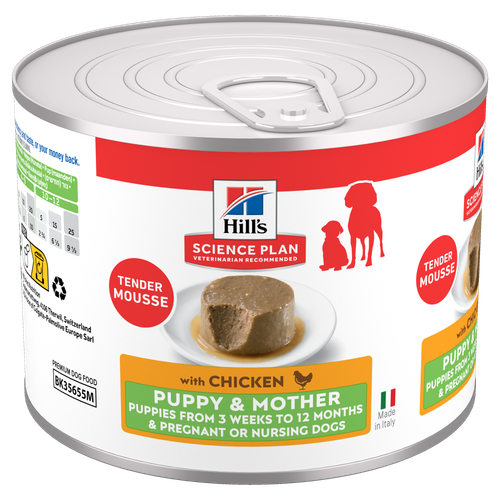 Puppy & Mother Tender Mousse Dog Food
Puppy & Mother Tender Mousse Dog FoodHill's Science Plan Puppy & Mother Tender Mousse Dog Food with Chicken is a complete premium pet food for puppies and pregnant or nursing dogs. Formulated with chicken and other specially selected ingredients, including minerals and antioxidants to support gut health and optimal growth, it comes in a soft mousse texture they'll love.
Shop Now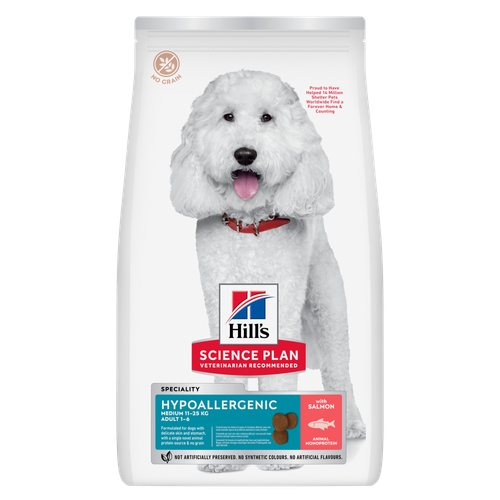 Hypoallergenic Medium Adult Dog Food
Hypoallergenic Medium Adult Dog FoodScience Plan Hypoallergenic Medium Adult dog food with Salmon is a gentle, science-led formula crafted for dogs with food sensitivities. Made with carefully selected, high-quality novel proteins and no grains, it’s tailored to minimise common triggers that can lead to skin and digestive discomfort.
Shop Now Perfect Weight Small & Mini Adult Dog Food
Perfect Weight Small & Mini Adult Dog FoodHill's Science Plan Adult Small & Mini Dog Food with Turkey is a complete premium pet food for adult small dogs from 1 year old that are prone to weight gain or slightly overweight. This deliciously smooth mousse is formulated to deliver the appropriate amount of energy to support weight maintenance in adult dogs.
Shop NowFeatured products Hypoallergenic Dry Cat Food
Hypoallergenic Dry Cat FoodHILL'S SCIENCE PLAN Hypoallergenic Adult cat food with egg & insect protein is a complete pet food for adult cat 1–6 years old. It's formulated for cats with delicate skin and stomach, with limited high quality novel protein sources & no grain.
Shop Now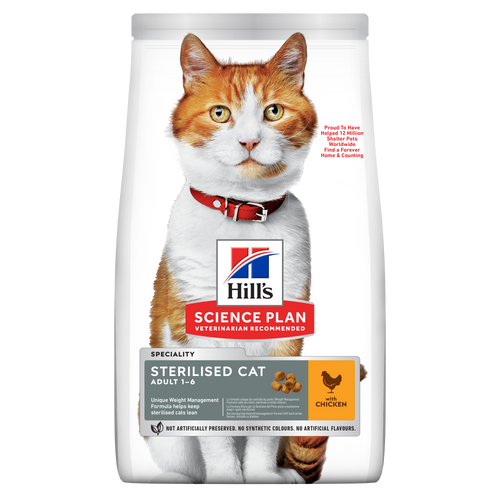 Sterilised Adult Cat Food
Sterilised Adult Cat FoodHill's Science Plan Adult Sterilised Cat Dry Food with Chicken is specially formulated with ActivBiome+ Multi-Benefit Technology. It is a precisely balanced nutrition, tailored to meet the needs of sterilised cats, to help keep sthem lean & healthy.
Shop Now Oral Care Adult Cat Food
Oral Care Adult Cat FoodHill's Science Plan Oral Care Adult Cat Food with Chicken contains clinically proven kibble technology to reduce plaque & tartar build up.
Shop Now -
Dog
- Dog Tips & Articles
-
Health Category
- Weight
- Food & Environmental Sensitivities
- Urinary
- Digestive
- Joint
- Kidney
-
Life Stage
- Puppy Nutrition
- Adult Nutrition
- Senior Nutrition
Cat- Cat Tips & Articles
-
Health Category
- Weight
- Skin & Food Sensitivities
- Urinary
- Digestive
- Kidney
-
Life Stage
- Kitten Nutrition
- Adult Nutrition
Featured articlesTips for Working From Home With a PetGet helpful information on how to get all of your work done while keeping your dog or cat entertained when working from home.
Read More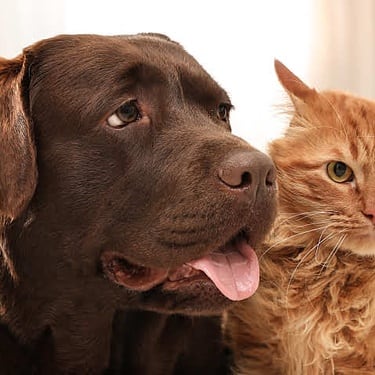 What Cleaning Products Are Safe for Pets?
What Cleaning Products Are Safe for Pets?Learn which cleaning product ingredients can be hazardous for dogs & cats, which alternatives are safer and tips for using cleaning products around pets.
Read More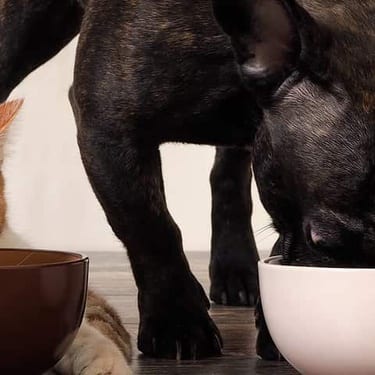 Pet Supply Storage: 8 Upcycling Crafts for Bags and Cans
Pet Supply Storage: 8 Upcycling Crafts for Bags and CansGet helpful hints and tips on how to creatively upcycle your pet's food bags and cans, helping to reduce waste and give your home some visual flair.
Read More -


Your dog getting lost is probably one of your worst nightmares. You love your pet and the thought of them being away from home, afraid and unsure of what to do, is heartbreaking for you. This is exactly why knowing what to do if you find a lost dog is important, so that you can keep them safe and reunite them with their own pet parents.
But do you know how to handle a dog who's lost? Should you call the police or animal control to ask for their help, or take the dog you found to your home? Use this guide to understand how to proceed if you find a lost dog.
Step 1: Be Careful in Your Approach
If you see a dog that appears to be lost, your first instinct might be to go toward it to help, but it's better to be cautious and look for clues as to whether the dog is showing signs of being distressed or aggressive. While your intentions come from a place of kindness, the dog may be fearful or experiencing a heightened sense of stress. If you're not sure what to do when you find a dog who seems agitated, it's often best to hang back.
The American Kennel Club (AKC) says, "Some signs to watch for include stiff body language, bared teeth and hair standing on end [...] Remember, a wagging tail only means an emotionally aroused dog, and it's no guarantee of a friendly attitude."
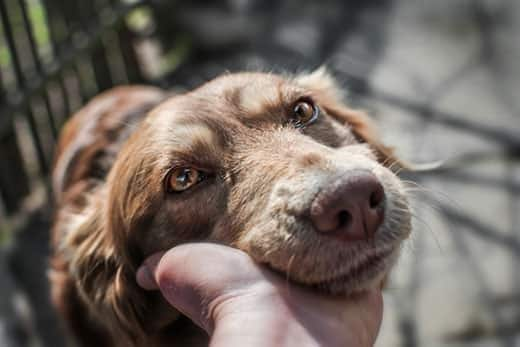
If you can approach the dog, do so calmly. However, you don't have to approach them to help, and you shouldn't if the dog doesn't seem to welcome your behaviour. If you're able to, take a picture or video of the animal that may help with identifying the pet later.
Aggressive behaviours shouldn't be the only thing concerning you, either. The dog may have rabies or another illness that could make you very sick if you were bitten as you approached.
Step 2: Make Sure the Dog Is Safe
Assuming that you're able to approach the dog, and they feel safe in your presence, one of the best things you can do is to make sure the dog is safe and secure. This may mean taking them into your yard or securing them with a leash in the area where you found them. This ensures the pet won't run off again, giving you the chance to get in touch with their owner or animal control.
Just make sure not to let the dog you've found mingle with your own pets. You don't want either pet to feel threatened by the other's presence and act out of aggression. Even if you're convinced they'd get along, consider that the lost dog may not be up-to-date with their vaccinations. They could have parasites like fleas or ticks that you don't want passed on to your pet.
Consider additional care opportunities like providing them with a bowl of water. However, do not feed the dog. Because you are unfamiliar with this dog, they might have special diet considerations and you don't want to further exacerbate their already stressful situation by causing an upset stomach. If you are keeping them outside, make sure to keep them in a cool shaded area during warmer weather or in a place to keep warm in winter months.


Tasty Tips
Step 3: Check for Identification
Now that you have the lost dog contained, the first thing you should do is check to see if the dog has any identification that will point you in the direction of their owner. They may have a tag on their collar with information like their name and their owner's information, such as telephone number or even address. Even if an identification tag isn't present, the dog might be wearing a city-issued tag which could help the animal control department or shelter to identify whose pet it is.
You won't be able to tell if the dog has been microchipped, but if they have, the animal control officer, veterinarian or pet shelter technicians will scan it to see if they can match the dog you've found with their pet parent.
Step 4: Alert the Masses
Contact your network of family and friends on social media. Wondering what to do if you find a lost dog? Well, your friends and local community can help you spread the word that you're currently caring for a wayward pet. Similarly, if you weren't able to approach the dog because they were showing signs of aggression or anxiety, or simply because the dog was too skittish and ran before you could approach them, social media may be able to help.
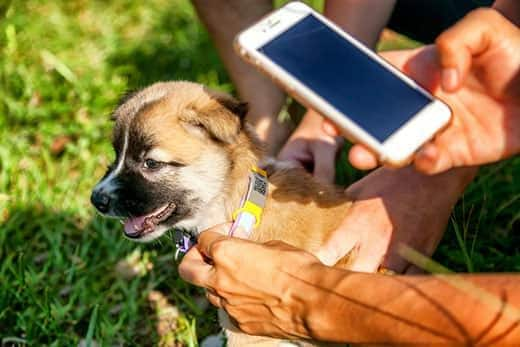
Upload the video or images you took of the pet and post them to any local groups you belong to or pages you follow. Share the image on your own news feed and ask your friends to share on theirs. Don't forget to list any identifying information the images may not have picked up, as well as where and when you noticed the pet. The location is just as important as the description.
Step 5: Call the Right People
If you've found a tag with identification, it's time to reunite the dog with their pet parents. If there's a number, call it and let them know you've found the dog and that they're safe. If there's just an address, take your new furry friend for a drive to their home. Just be sure to keep them leashed and close by at all times. This isn't a scenario where you'll want to leash the pet to their front porch and leave. Their owner may have relocated or the dog might get loose before they come home if they still live there. If nobody's home, you can always try again another day.
If the dog has no identifying information, try contacting animal control, the police, a local shelter or even your vet's office. All will have a different way of approaching the situation. A shelter or veterinarian may advise you to bring the pet in to see if they have been microchipped, they'll be able to pull up the dog's owner information to contact them. Animal control might be your best bet if you don't know what to do if you find a lost dog who appears aggressive or ill and you've determined it's not safe to approach them on your own.
If it's after hours and animal control isn't open, many local police departments will help. If the dog is calm and approachable, you can bring them to a shelter for protection. If the lost dog has an injury and you're willing to help get them treatment, bring them into the vet's office.
You may decide to take the dog home with you if you have a space to keep them safe and comfortable while you look for the owner, and that's okay. If you do this, know that the AKC still recommends contacting your local shelters to share a description of the dog with them. According to the AKC, "Even if you choose to keep the lost dog with you rather than turning the dog over to a shelter, letting the shelter know you have the dog increases the owner's odds of finding you and therefore their lost pet."
There's no need to worry about what to do if you find a lost dog anymore. As long as you approach with caution, check for ID tags and call in help if needed, you'll be doing the right thing.


One of our staff authors prepared this article for you
Related products
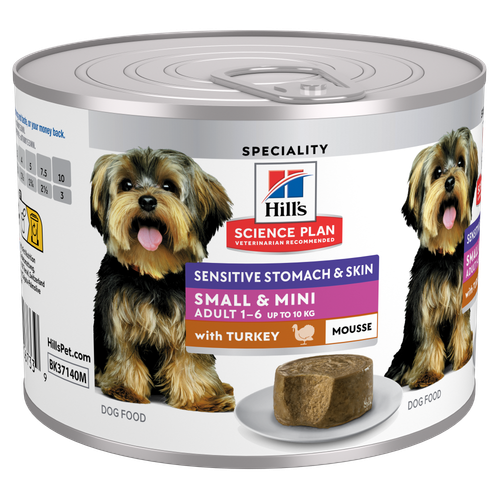
Hill's Science Plan Sensitive Stomach and Skin Small & Mini Adult Dog Food with Turkey is a complete premium pet food for small breed adult dogs aged 1–6 years. This deliciously soft mousse is enriched with ingredients that support digestive health & skin care.

Hill's Science Plan Adult Small & Mini Dog Food with Turkey is a complete premium pet food for adult small dogs from 1 year old that are prone to weight gain or slightly overweight. This deliciously smooth mousse is formulated to deliver the appropriate amount of energy to support weight maintenance in adult dogs.

Science Plan Hypoallergenic Medium Adult dog food with Salmon is a gentle, science-led formula crafted for dogs with food sensitivities. Made with carefully selected, high-quality novel proteins and no grains, it’s tailored to minimise common triggers that can lead to skin and digestive discomfort.

Hill's Science Plan Puppy & Mother Tender Mousse Dog Food with Chicken is a complete premium pet food for puppies and pregnant or nursing dogs. Formulated with chicken and other specially selected ingredients, including minerals and antioxidants to support gut health and optimal growth, it comes in a soft mousse texture they'll love.
Related articles
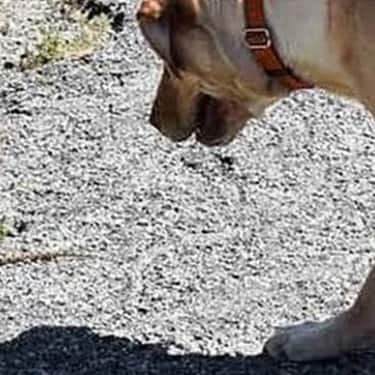
Learn about snake bites on dogs, including clinical symptoms to look for, what to do if you think your dog was bitten, and treatment & prevention options.
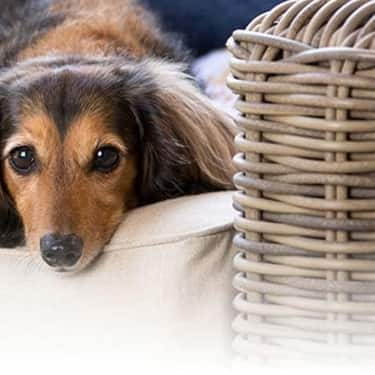
Puppy, kitten and pet dieting, cat nutrition and dog nutrition information from Hill's Pet

Dog obesity is a significant problem - learn more about helping your dog become trimmer and healthier through improved nutrition.

Discover the causes, signs, and treatments of kidney disease in dogs and find methods of supporting your dog's kidney health. Learn more at Hill's Pet South Africa.

Put your dog on a diet without them knowing
Our low calorie formula helps you control your dog's weight. It's packed with high-quality protein for building lean muscles, and made with purposeful ingredients for a flavorful, nutritious meal. Clinically proven antioxidants, Vitamin C+E, help promote a healthy immune system.
Put your dog on a diet without them knowing
Our low calorie formula helps you control your dog's weight. It's packed with high-quality protein for building lean muscles, and made with purposeful ingredients for a flavorful, nutritious meal. Clinically proven antioxidants, Vitamin C+E, help promote a healthy immune system.

